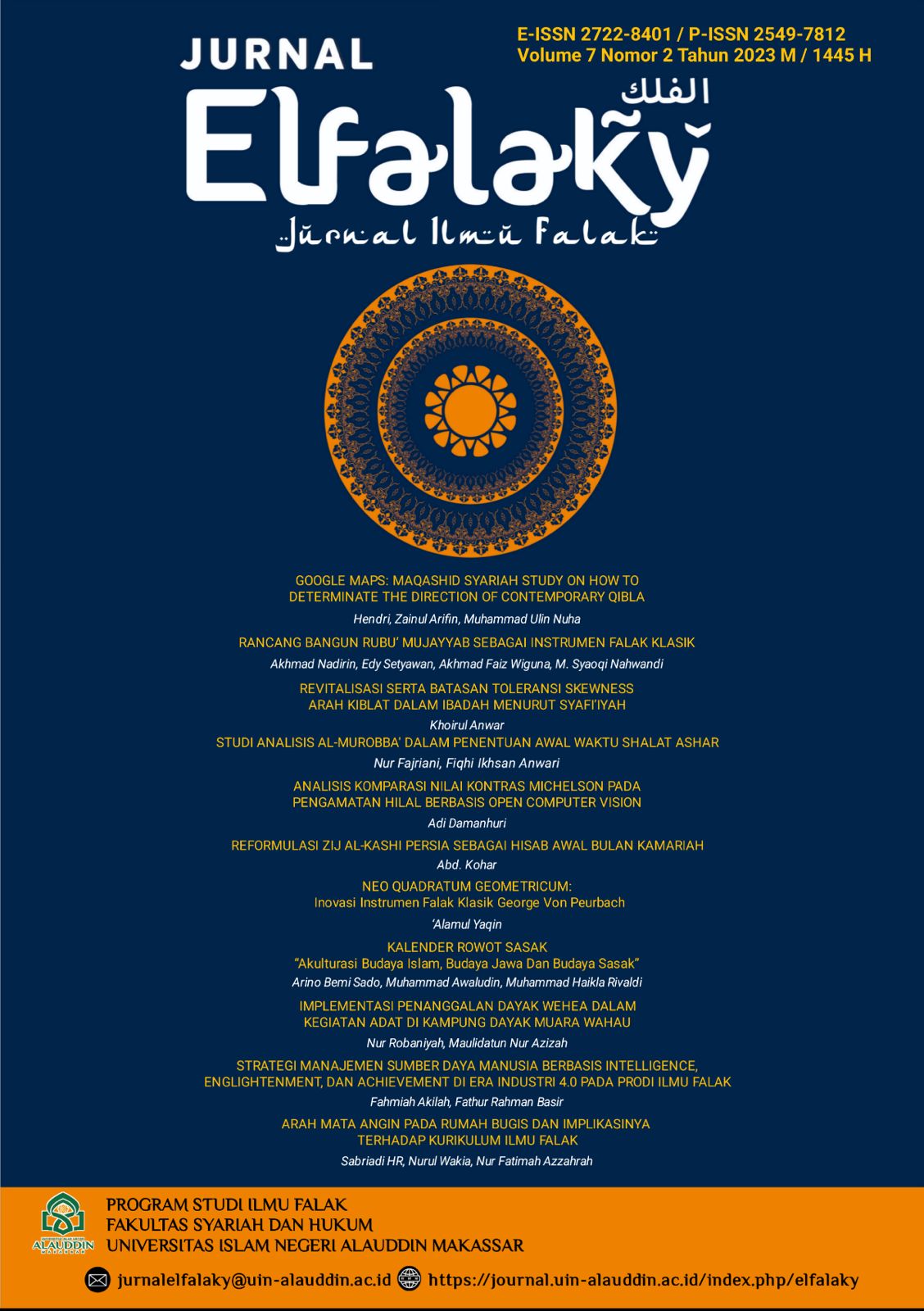STRATEGI MANAJEMEN SUMBER DAYA MANUSIA BERBASIS INTELLIGENCE, ENGLIGHTENMENT, DAN ACHIEVEMENT DI ERA INDUSTRI 4.0 PADA PRODI ILMU FALAK
Abstract
A sustainable human resource management strategy in the Astrology Study Program is an important aspect in facing the industrial era 4.0, so that the astronomy study program can remain relevant and competitive in producing graduates who are able to compete amidst the complex dynamics of Industry 4.0. The aim of this research is to analyze, design, and implement sustainable human resource management strategies in the astronomy sciences study program, so that they are able to maximize individual potential, improve the quality of teaching, and meet the demands of industry 4.0. This type of research is Library Research using a qualitative descriptive method approach that connects existing theories with the current descriptive reality of astronomy. Meanwhile, textual data was obtained from several literature sources and scientific articles related to this research. The conclusion of this research is that the implementation of a human resource management strategy based on intelligence, enlightenment and sustainable achievement in the astronomy sciences study program is able to increase the efficiency, effectiveness and competitiveness of institutions in facing the challenges of the industrial era 4.0. The implication of these findings is the need for commitment and investment from all related parties, including university leaders, lecturers, staff and other stakeholders, to implement sustainable human resource management strategies to achieve institutional goals and advance astronomy study programs in the industrial era 4.0 .
References
Achmadi. (2005). Ideologi Pendidikan Islam: Paradigma Humanisme Teosentris. Pustaka Pelajar.
Aftab, J., Abid, N., Cucari, N., & Savastano, M. (2023). Green human resource management and environmental performance: The role of green innovation and environmental strategy in a developing country. Business Strategy and the Environment, 32(4), 1782–1798. https://doi.org/10.1002/bse.3219
Aggarwal, P., & Agarwala, T. (2023). Relationship of green human resource management with environmental performance: mediating effect of green organizational culture. Benchmarking, 30(7), 2351–2376. https://doi.org/10.1108/BIJ-08-2021-0474
Zohar, D., & Marshall, I. (2000). Kecerdasan Spiritual. In Blomsbury, Britain.
Agustian, A. G. (2021). Rahasia Sukses Membangun Kecerdasan Emosi dan Spiritual ESQ: Emotional Spiritual Quotient Berdasarkan 6 Rukun Iman dan 5 Rukun Islam. Arga Wijaya Persada.
Andersson, F. N. G., & Arvidsson, S. (2023). The impact of the Covid-19 pandemic on the environmental sustainability strategies of listed firms in Sweden. Business Strategy and the Environment, (March), 1–15. https://doi.org/10.1002/bse.3487
Budhwar, P., Chowdhury, S., Wood, G., Aguinis, H., Bamber, G. J., Beltran, J. R., … Varma, A. (2023). Human resource management in the age of generative artificial intelligence: Perspectives and research directions on ChatGPT. Human Resource Management Journal, 33(3), 606–659. https://doi.org/10.1111/1748-8583.12524
Gunawan, A. W. (2016). Genius Learning Strategy: Petunjuk Praktis untuk Menerapkan Accelerated Learning (Cet. 7). PT. Gramedia Pustaka Utama.
Ghobakhloo, M., Iranmanesh, M., Grybauskas, A., Vilkas, M., & Petraitė, M. (2021). Industry 4.0, innovation, and sustainable development: A systematic review and a roadmap to sustainable innovation. Business Strategy and the Environment, 30(8), 4237–4257. https://doi.org/10.1002/bse.2867
Hasan, A. B. P. (2016). Psikologi Perkembangan Islami: Menyingkap Rentang Kehidupan Manusia dari Prakelahiran hingga Pascakematian. PT. RajaGrafindo Persada.
Izzuddin, Ahmad. Analisis Kritis Hisab Awal bulan Qomariyyah dalam Kitab Sulam Nayyirain (skripsi), Semarang: Fakultas Syari’ah IAIN Walisongo Semarang, 1997.
Li, M., Fu, N., Chadwick, C., & Harney, B. (2023). Untangling human resource management and employee wellbeing relationships: Differentiating job resource HR practices from challenge demand HR practices. Human Resource Management Journal, (May), 1–22. https://doi.org/10.1111/1748-8583.12527
Londono-Escudero, C. (2023). Nature governance for collective well-being: reconciling holistic sustainability and human development. Journal of Humanities and Applied Social Sciences, 5(3), 193–210. https://doi.org/10.1108/jhass-02-2022-0029
Luu, T. Van, Chromjaková, F., & Nguyen, H. Q. (2023). A model of industry 4.0 and a circular economy for green logistics and a sustainable supply chain. Business Strategy and Development, (August), 1–24. https://doi.org/10.1002/bsd2.286
Mishra, P. (2017). A framework for sustainable organizational development in an emerging economy. International Journal of Organizational Analysis, 25(5), 762–788.
Mohammed, A. A., & Fisal, M. Z. (2023). The nexus between green human resource management processes and the sustainability of educational institutions: the mediating effect of strategic excellence. Journal of Applied Research in Higher Education, 15(4), 947–965. https://doi.org/10.1108/JARHE-12-2021-0443
Muhajarah, K., & Sulthon, M. (2020). Pengembangan Laboratorium Virtual sebagai Media Pembelajaran: Peluang dan Tantangan. Justek : Jurnal Sains Dan Teknologi. https://doi.org/10.31764/justek.v3i2.3553.
Mukhuty, S., Upadhyay, A., & Rothwell, H. (2022). Strategic sustainable development of Industry 4.0 through the lens of social responsibility: The role of human resource practices. Business Strategy and the Environment, 31(5), 2068–2081. https://doi.org/10.1002/bse.3008
Samsuddin, S. (2012). Format Baru Transformasi Pendidikan Islam. Islamica: Jurnal Studi Keislaman, 7(1), 161–185.
Sakai, S. ichi, Yano, J., Hirai, Y., Asari, M., Yanagawa, R., Matsuda, T., … Moore, S. (2017). Waste prevention for sustainable resource and waste management. Journal of Material Cycles and Waste Management, 19(4), 1295–1313. https://doi.org/10.1007/s10163-017-0586-4
Shourkaei, M. M., Taylor, K. M., & Dyck, B. (2023). Examining sustainable supply chain management via a social-symbolic work lens: Lessons from Patagonia. Business Strategy and the Environment, (August), 1–20. https://doi.org/10.1002/bse.3552
Sypniewska, B., Baran, M., & Kłos, M. (2023). Work engagement and employee satisfaction in the practice of sustainable human resource management – based on the study of Polish employees. In International Entrepreneurship and Management Journal. https://doi.org/10.1007/s11365-023-00834-9
Szetey, K., Moallemi, E. A., & Bryan, B. A. (2023). Knowledge Co-Production Reveals Nuanced Societal Dynamics and Sectoral Connections in Mapping Sustainable Human – Natural Systems Earth ’ s Future. 1–20. https://doi.org/10.1029/2022EF003326.
Saiyidain, K. G. (1981). Percikan Filsafat Iqbal Mengenai Pendidikan, terj. MI Soelaeman, Bandung: Diponegoro.
Raihani, R. (2010). Kepemimpinan sekolah transformatif. LKiS Yogykarta.
Pasiak, T. (2016). Manajemen Kecerdasan: Memberdayakan IQ, EQ dan SQ untuk Kesuksesan Hidup. Mizan.
Wibawa, S. (2018). Pendidikan dalam era revolusi industri 4.0. Indonesia. Yogyakarta: UST Yogyakarta.





